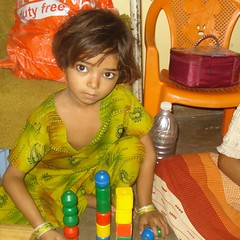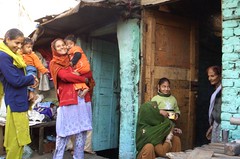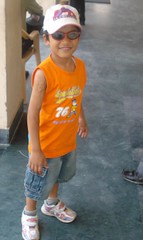
by Anuradha Bakshi | May 10, 2008 | Uncategorized

Little Radha is 7. She suffers from ostoegenesis or brittle bone disease has terribly deformed legs and is unable to stand. The slightest fall or hit causes a fracture as her bones have become terribly porous. She has already had more than a dozen in her tiny life.
She came to our office in the arms of her mother clad in a fleece outfit. The ambient temperature of the moment must have been 40 degrees Celsius. When we asked her mother why she was wearing such an outfit, the answer was simple and direct. She had no other decent clothes.
Radha lives in a sunken hovel, the roof of which is lower than a person standing and where not a shred of light enters. Her father lost his job as the factory in which he worked closed. He now sells tea but can barely make both ends meet as they have 4 children. Radha seemed a healthy child till the age of two when she first fell and broke her leg. It was then that she was diagnosed with osteogenesis.
1 in 60 000 children get osteogenesis and little Radha is one of them. Also known as brittle bone disease the ailment has no known cure. Management of the disease includes focusing on preventing or minimizing deformities and maximizing the child’s functional ability at home and in the community. Sound doable but in a home like hers it is close to impossible. Support groups exist but not for someone like our little Radha. The prognosis is scary as it not only affects bones but can result in brittle teeth, loss of hearing and easy bruising. The main cause is little or poor type of collagen.
Wheelchairs or braces are recommended and exercise like swimming is extremely beneficial. But where does a child like Radha go to swim or how does she use a wheelchair in the hole in which she lives. A child with OI needs good nutrition, rich in calcium, leafy vegetables, cereals, milk products all not within reach of a family that barely survives. The doctors had suggested this but for a family that can barely feed 6 mouth this was quasi impossible. And little by little her legs contorted as she suffered one fracture after the other.
New research suggests the use of bisphosphonates that seem to have has excellent results but that still seems at a trial stage. We will of course look into it!
Radha was denied any form of childhood and could not accompany her siblings to school or play. She just lived in her dark hole and dragged herself from one corner to the other. Two of her siblings come to our creche and that is how we came to know about her. Thank heavens her spine of head did not suffer any fracture!
Radha is an intelligent child who could learn like any other seven year old but her ailment closed all doors to her. We hope to be able to help her as best we can. As you know we at project why believe in miracles!

by Anuradha Bakshi | May 6, 2008 | Uncategorized

”We want to preserve their childhood days so that tomorrow if they ever want to see how they were, where they were, they could easily get to see those precious moments. We gift a CD to the parents of the adopted child,” says Madhuri Abhyankar, Director, Sofosh Orphanage.
This is a new initiative launched by an orphanage is an extremely sensitive and a step in the right direction. Adopted children often have the desire to know where they came from, what happened to them, why their natural parents abandoned them and so on.
Childhood needs to be preserved as nothing is worse than not knowing, even the if the truth is harsh. I wonder though how a child would feel of he or she finds out that it was left at a doorstep, in a garbage dump, at a railway station or simply to die. This is the case in India today.
A touching comment on a recent post says: Our 6 year old daughter was a 7 day old foundling left abandoned with a note in the train station at Kattack. Our 12 year old daughter was abandoned after birth at St. Ann’s Hospital in Kumbakonam. I often wonder if their birth mothers ever think of them, wonder about them, worry for them, if they realize what they gave up. I pray that these were the last desperate acts of desperate women hoping that their child might possibly have a better lot in life and not just the disposing of an unwanted commodity.
In a country where life is cheap and the life of a baby girl even more so, where babies are sold for a few farthings for nefarious ends, one wonders how many children do reach orphanages and how many are condemned to lives with no hope of escape? And yet no matter how sordid one’s past, there is a journey everyone has to make at some time of his or her life.
These memories frozen on some digital media will undoubtedly one day heal many hearts

by Anuradha Bakshi | May 4, 2008 | Uncategorized
 Rakhee was one of our brightest little sparks. She had first come to us almost 4 years back when she was about 2 year old. Her story is one of total hopelessness and despair. When you hear it you may feel that is a one in a kind but sadly it is the story of many little girls in this land. It is also one that shows that in spite of our best efforts, there are times when we stand helpless.
Rakhee was one of our brightest little sparks. She had first come to us almost 4 years back when she was about 2 year old. Her story is one of total hopelessness and despair. When you hear it you may feel that is a one in a kind but sadly it is the story of many little girls in this land. It is also one that shows that in spite of our best efforts, there are times when we stand helpless.
Rakhee’s father is a construction labourer, one of the millions who flock into India’s capital in search of work. We first met her when her father got work on a site close to our project. They had pitched a small shack on the road and though we passed that way every morning we never saw her.
One day one of our teachers walked into the office quite agitated and told us about a pregnant woman who seemed to have a broken arm and yet carried heavy loads all the time. The woman was Asha; she was not more than 16. She was 8 months pregnant and her arm had been broken by her drunk husband and never attended to. It had just set on its own.
We did take her to the hospital but were told that nothing could be done.We looked after her and fed her emaciated body as best we could. Rakhee joiner our creche. A few weeks later Preeti was born. Asha told us her story: orphaned at a young age she was brought up in an uncle and aunt who married her off to the first man they found. He drank, gambled and beat her with obsessive regularity. He made her work too but there was never enough money to eat.
For some time we helped the family as best we could and even gave Asha a job but nothing truly changed. Preeti grew up in our creche and we got attached to her. But things remained the same in her home and no matter what we tried nothing changed.
One day the little girl stopped coming. We heard that they had shifted to another site. A few months later Asha came back carrying her two kids and told us hat her husband was in jail as he had been caught selling hooch. Once again we helped her and the little girls came back to project why. Rakhee was ready for class I and we were hoping to admit her to regular school. The husband was released and we even gave him some work hoping that it would bring some respite to the family. We were aghast when we heard that Asha was pregnant again but then did we not live in a land where everyone wanted a son. Blissfully the next child was a boy.
But the story did not end there. Once again the family disappeared. Another job on another site. Rakhee was never put in school. She joined the ranks of the thousands of kids that sit on road side while their parents work on the innumerable construction sites that have sprung in our city to make it world class!
Some time back we got news of the family via a surreptitious phone call made by Asha to one of the teachers. She was pregnant again and had been brutally beaten by the police and even kicked in her stomach, as she was caught selling hooch. Her husband made her do that forcibly while he gambled and drank.
We tried to call her to find out where she was but the wily husband had changed his phone number.
Little Rakhee and her siblings are somewhere in this city in state despair and misery and we have no way to reach out to them.
At timea like these I feel totally utterly powerless.

by Anuradha Bakshi | May 1, 2008 | Uncategorized
 A glittering report was aired yesterday about the new home of one of India’s richest man. Quite a home: 27 floors, 400 000 square feet of space, bathrooms as big as flats, private cinema theatre, gyms and juice bars, 4 floors for parking and all for one family! At a whopping two billion dollars it is the world’s most expensive home!
A glittering report was aired yesterday about the new home of one of India’s richest man. Quite a home: 27 floors, 400 000 square feet of space, bathrooms as big as flats, private cinema theatre, gyms and juice bars, 4 floors for parking and all for one family! At a whopping two billion dollars it is the world’s most expensive home!
In another part of the same country Jyoti lives with her family and neighbours in a slum. Her home has 80 square feet and no bathroom or kitchen but is her home and she has made the best of what she has: a little shelf displaying some steel crockery- remains of her dowry-, few plastic decoration pieces bought at the local china bazaar, a little TV that brings the world into her home and lots of smiles and giggles as she proudly shows her dog eared photo album.
A few years back when we still were running a centre at the Lohar basti – the gypsy camp – little Ritu a spunky 3 year old whose house was one of the last ones of the camp was often given the task of showing her home to visitors. She lived in a shack covered by a tarpaulin where one corner was filled with rags as her father a ironmonger by trade often picked rags to supplement his income. The dwelling has one large bed piled with clothes, a small rickety cupboard and not much else. It was dark, dingy and humid. I remember a day when I asked her to show her ‘home’ to a friend who had come by. Ritu the ever confident kid, bearing the age old pride of her clan firmly took my friends hand in hers and holding on to her slipping pant with the other marched off. We followed her. As she reached the entrance of her home she said with the confidence of a queen in a loud and clear voice and a regal gesture: Yeh Hai! – This is it-, as if her home was a palace!
And what was heart warming and wrenching at the same time is that it was she felt. This was her home, a place she loved and where she had spent happy moments. The visit was not over. She invited us in, cleared the bed, made us sit and set out to give us a tour of the place. She opened the cupboard and showed off her clothes and those of her parents and then looking for her mom simply said: chai banao – make some tea!
Needless to say we were all moved to tears as millions of questions begging for answers ran through our mind begging for answers. Why were people still living like this in a country that boasted it was shining!
Strange that this incident should come back to my mind today after seeing images of the most expensive home in the world. I simply wonder whether the richest family can ever feel the same pride that the little gypsy girl.

by Anuradha Bakshi | May 1, 2008 | Uncategorized
 Had Popples not come into my life, Dear Popples would never have seen the light of day. The young man you see in the picture look nothing like the bundle swathed in bandages, his huge eyes filled in pain who walked into my heart on a March morning in 2002. This one looks more like the pasha – read hero – he wants to be.
Had Popples not come into my life, Dear Popples would never have seen the light of day. The young man you see in the picture look nothing like the bundle swathed in bandages, his huge eyes filled in pain who walked into my heart on a March morning in 2002. This one looks more like the pasha – read hero – he wants to be.
Yet Popples changed my life in more ways than one. He taught me hope, love in its purest form, survival no matter how dark the hole you are in is, but above all he became the mirror that showed me who I was, what I had become, and how I could change with time.
Popples makes dreams come true, even very old ones, those you have forgotten or even relegated to some dark recess of your mind as they seem ludicrous and even absurd.
I must have been 15 or or so when I first read Bonjour Tristesse, by Francoise Sagan and as luck would have it I read it sitting on the terrace of a Latin Quarter in Paris. The book not only had the kind of story that would make any young girl swoon, but was written when the author was 17 and has failed her end of school exam. That was the time I think I first dreamt of writing a book!
But books need stories, the kind that wrench your heart and soul, the kind that ring true, the kind that touch others and my life seemed dull and almost jaded. And whatever creativity a young mind could have had, was quickly silenced by the monotony of life.
But dreams do not die. They just wait patiently for the right moment to resurface, even if the right moment is light years ahead. Popples was the catalyst that brought the discarded dream back to life.
My publishers have categorized it as fiction: inspirational and I am deeply grateful for dreams belong to that realm, or do they? I think Abhigyan and Mrinal have put in words as only they can, what I have always felf but never been able to say:
To accept the real is not to accept that it is perfect. Reality is like clay. It is the starting point and not the end of things. At the beginning of the race all runners are at zero. Reality. One goes on to win. He changes reality. Shapes reality. Those who fail – accept that reality and start again on a fresh race. Everyone is back on the starting block. Reality waits to be shaped again. The race is long. And it is continuous. Every moment reality awaits our turn to shape it. To deny it is to escape into wishful inaction. To simply accept it is to stay at the starting block forever. Only way forward is to run.
When our stories become ordinary and the ordinary becomes a virtue; then virtue itself becomes ordinary and the only extraordinary thing left is murder and mayhem. For it is easy to ignore daily goodness like helping someone cross the street but crushing someone on the same street under speeding wheels is bound to generate more interest. At least in these cynical times. Which is why it is the job of stories to exemplify and exaggerate goodness.
Goodness is not sticky when it is mundane. Murder is.
If we want a society of goodness, kindness, compassion, courage and excellence we must tell stories of extraordinary goodness, compassion and excellence. And the extraordinarily good, kind, compassionate and courageous is called a hero.
We are all ordinary but it is the stories of our heroes that inspire us to rise above the ordinary when the moment demands. Without heroes, with the ordinary grey protagonist, all we find are echoes of our own fallible, flawed selves and when the moment calls – the hero within us fails to stir because all he has experienced in life as well as imagination are defeat, despair, fallibility and flaws. When the forces of murder and mayhem confront us in their dark, blacker than Black colour, we are choked in our throats with grey balls of fear and apprehension while the white light of courage and conviction ebbs away from our heart like the blood from our veins.
There are no heroes in life when there are no heroes in our stories.
For life is a story. The story!
Anouradha & Popples’ is an extraordinary story. More so because they have lived it.
Abhigyan and Mrinal Jha

by Anuradha Bakshi | Apr 30, 2008 | Uncategorized
 I must have been quite young when I first heard about dream catchers. As a kid it was comforting to believe that there was something that ensured that only good dreams came your way while bad ones slipped out. Someone had given me a dream catcher and I felt comforted having it hanging above my bed.
I must have been quite young when I first heard about dream catchers. As a kid it was comforting to believe that there was something that ensured that only good dreams came your way while bad ones slipped out. Someone had given me a dream catcher and I felt comforted having it hanging above my bed.
I soon grew up and the delicate dream catcher got lost as we moved from continent to continent and I forgot about it. It was only yesterday when I heard that Dear Popples was published that I suddenly remembered the dream catcher of my childhood.
The lore of the dream catcher is beautiful.
Long ago when the word was sound, an old Lakota spiritual leader was on a high mountain and had a vision. In his vision, Iktomi, the great trickster and searcher of wisdom, appeared in the form of a spider. Iktomi spoke to him in a sacred language. As he spoke, Iktomi the spider
took the elder’s willow hoop which had feathers, horse hairs, beads and offerings on it and began to spin a web. He spoke of the cycles of life….how we begin as infants and move on to childhood, and then to adulthood. Finally, we go to old age where we must be taken care of once again as infants, thereby completing the life cycle.
Iktomi said, “In each time of life there are many forces and choices made that can affect the harmony of nature, and interfere with the Great Spirit and all of his wonderful teachings.” Iktomi gave the web to the Lakota elder and said, “See, the web is a perfect circle but there is a hole in the center of the circle. If you believe in the Great Spirit, the web will catch your good dreams and ideas – – and the bad ones will go through the hole.
When I look back at the past few years I am sure that an invisible dream catcher hung over my life helping me make the right choices or how else would all that has come my way happen? But dream catchers are not just about choices and ideas; they are also about dreams. And though I hardly have dreams about myself, one seems to have got caught in some remote corner of the web: that of dear popples being published!
The Great Spirit thought otherwise and set his own wheel in motion and knowing that I would never find the time, the way, the force, the motivation to keep this dream alive, entrusted my dream to someone else. That was Abhigyan a true dream maker!
You do not thank Great Spirits and dream makers. You simply feel blessed that they came your way.












